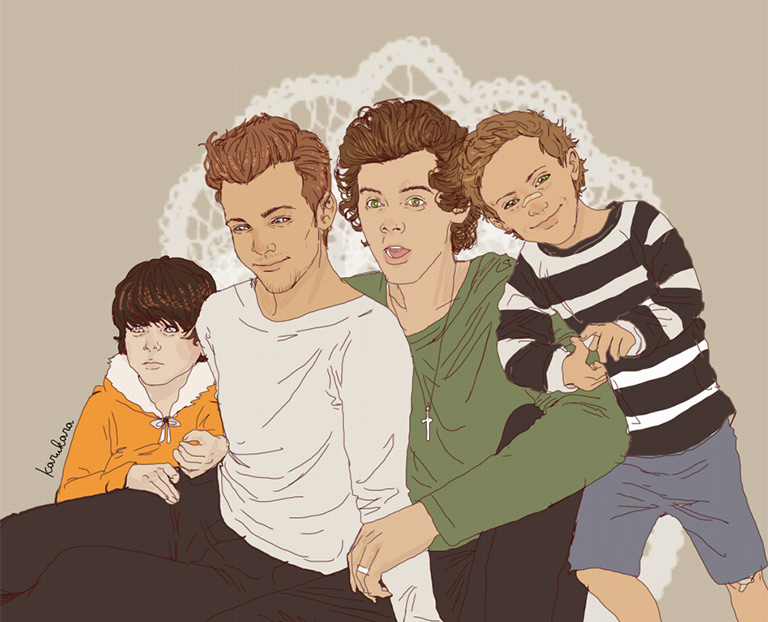Prompt 1: The desiring fangirl reproduces heteronormative ideals through the creation of fluffy, cutesy, day-in-the-life-of fictions of boy-on-boy romance, domesticity, and male pregnancy. But while appearing to uphold norms à la homonormativity, some fan fictions "open possibilities for resignifying the terms of violation against their violating aims" (Judith Butler). On reproducing and accelerating what is given to be “norm,” the fangirl envisions a post-homonormative life, or so this story goes…
"Welcome to a new world order! Coming soon to a mainstream near you.” This is where Lisa Duggan leaves us in her 2002 essay "The New Homonormativity: The Sexual Politics of Neoliberalism," which examines an emerging politics after “gay liberation.” Instead of contesting dominant heteronormative ideologies and institutions, this new homonormativity upholds and sustains them. Duggan’s examples include the work of lesbian and gay organizations in the 90s such as the Independent Gay Forum (IGF) and writers like Andrew Sullivan, author of Virtually Normal, who argued that marriage is “the highest form of human happiness,” “a profoundly humanizing, traditionalizing step” and “ultimately the only reform that truly matters.” Duggan’s discourse focuses on showing how homonormativity abandons earlier political commitments to economic redistribution and protection of sexual freedoms by marginalizing those who challenge serial monogamy and those who feel oppressed by a binary gender or sex system – including transgender, bisexual, pansexual, and intersex people.
Since then, much of the discussion on homonormativity surveys the ways in which it intersects with white privilege, capitalism, sexism, transmisogyny, and cissexism by veering for acceptance within economic and political systems in its quest for equality. Now, well over a decade after this “new world order” and since legal endorsements of gay marriage in the mainstream, the normative and family-oriented political agendas of the IGF are easily reinforced in domestic partnerships, adoption, and gender-normative social roles. And while homonormativity is reproduced and consumed through a growing number of commercial television series, its incorporation (by mostly teenage girls) into the sub-genres of fan art and fan fiction might offer opportunities for its simultaneous assimilation and sublimation.
In the recent 2015 UK elections, it was teen girls who showed that there is more to politics than humorless strategic campaigning. 17 year old Abby Tomlinson’s instigation of Milifandom (and the tactical sexualisation of Labour candidate Ed Miliband) spoke back to the endless effluence directed towards Miliband by the rightwing press, whilst also demonstrating to campaigners — including Miliband’s own — the importance of young voices, not to mention their capacity for getting a successful press campaign together. Milifandom is one example of a publicly visible subversive movement surrounding the 2015 elections, instigated by an unassuming fangirl. While teen girls have used fandom as a way to experiment with their sexuality in unthreatening ways by practicing their first kiss on a poster of [insert heartthrob here], fan scholars have discussed the endless potentials of fan production — fan art and fiction — for re-working normative narratives.
Slash fiction, the popular (usually same-sex) narrative fiction produced by a female identifying majority, has been mostly celebrated for its subversive reworking of popular texts by introducing queer characterizations. Such re-workings are not always necessarily subversive, however, and with an increasing abundance of queer representation in popular culture, fan works can also function as a normative conservative force. Berit Åstrom, who has written extensively on fan fiction, notes that "slash may…rewrite dominant scripts and subvert heteronormative tropes, but it should not be assumed that the genre automatically produces resisting narratives." While sexually explicit slash and subgenres of smut such as “knotting” fic, in which dom characters non-consensually “breed” subs with bulbus glandis wolf-penises, can exemplify subversive re-workings of popular texts; the more cutesy domestic sub-genres such as “curtain fic” — in which the romantic leads go shopping for curtains — offer a counter-narrative to the desiring-production at stake both in the subversive resistant strategies of gay liberation, and the normalizing strategies of IGF et al.
The depictions of fluffy domestic lifestyles authored by fangirls like Karukara and sunshineamaryllis hold the potential to exceed the marginalizing force of homonormativity through a non-productive desiring relation — a desire that does not contribute to homonormativity nor work against it, but undermines its very production and consumption. Corporate boy band producers know very well that the effeminate, non-threatening boy image sells, and that there is perhaps nothing more “normal” than teen girls fantasizing about boy-on-boy relationships and male pregnancy. But in evolving from consumers of pop culture to producers of fanworks, fangirls create their own AUs (Alternative Universes) where there is no such thing as “norm,” and thus no “homonormativity” that imitates or reproduces the so-called “norm.”

Prompt 2: Mpreg married!Larry are grocery shopping with their precious toddler and Louis is pregnant again. He's practically glowing and looks like a total angel. Someone hits on Louis and Harry goes all possessive alpha caveman over his babies because damn it, Louis, the baby he carries in his womb and the one he carries in his arms are all his, and no one is gonna take them away from him!" (sunshineamaryllis)
Fan artist Karukara is a well-known “doodler” in “Larry” fandom - a subsect of One Direction fandom designated specifically to the shipping (romantic coupling) of boy band members Louis and Harry. Larry is her OTP (One True Pairing). In an interview Karukara tells me it is not that she is in love with the two boys so much as she is “in love with their love,” and that this is commonplace amongst fans. Larry fans put boy band members Harry and Louis into a relationship that is real and accumulate an abundance of evidence to prove so (#larryisreal). They create romantic scenes of domestic bliss in homes in middle class suburbia (Louis!bottom), they get Louis pregnant (mpreg), they create family portraits of the lesbian “boys” (whose own siblings look about five years younger than their fathers), amongst many other domestic scenarios that can be found in fics on sites like archiveofourown.org and fanfiction.net.
Neither working towards “gay liberation”, nor a moralistic recuperation of gay identities exemplified in groups like IGF, fangirls who create fluffy domestic slash may at first seem to be doing nothing but projecting heteronorms onto gay relationships — but the relationship of the fangirl to these fictions is made of a non-productive desire — of being “in love with their love” — in lieu of any normalizing agenda. Through depicted scenes of home improvements and marriage proposals, the fluffy slash produced isn’t necessarily imitative of heteronormativity, but conjures images of an ultimate equality where biological difference does not exist, and where sameness is produced through homonormativity without subversion. Welcome to the post-gender AU in which One Direction are mpreg, where there are no women and no men, and where there is no “norm,” or rather, where identities are not fixed, but inconsistent, as in IRL. The depoliticized gay culture “anchored in domesticity and consumption” that Duggan warned us against, despite perhaps at first appearing so, is thus not necessarily projected into slash fiction. What looks like homonormativity in slash is a representation without imitation and subversion of the “norm,” or an accelerated or abstracted sameness we might, for the sake of this story, call homonormcore.
Normcore, a term brought into use by self-defined “trend forecasting” group K-Hole, looks at the revolutionary potentials of sameness in a time when resistance strategies that rely on difference are increasingly coopted by neoliberalism’s make-over regime. Instead of difference, normcore moves into a post-authenticity that opts for sameness. So, if normcore is the understanding that “normality” doesn't exist, and finds “liberation in being nothing special” (following K-Hole), then homonormcore is the understanding that there is no such thing as homonormativity — at least for the teen girls who create slash fiction. This, of course, does not mean that every gay marriage proposal and gay adoption is a revolution, but raises the issue that if individuality is now very much a regulating capitalist desire, then perhaps one way out of this conundrum is through a sameness that is not imitative and exclusive, but adaptable and expansive.
In slash fic the hetero/homo binary becomes an inconsistent non-binary like mpreg/homonormcore, and reality and fantasy collapse into one another. In these fluffy fics, equality is conjured through a queer similarity — which is not the blankness of “normcore” but the strangeness and abstraction of a domestic sameness. Homonormativity upholds distinctions between the “normal and abnormal,” “reality and fiction” — while homonormcore breaks down such distinctions until all such binaries are unreconcilable. #homonormcore.
Unlike the obvious subversions of smut fic, fluffy domestic slash can question both queer resistance strategies — and the submission and absorption of queer into neoliberalism. Rather than leaving us in a productive critique of homonormativity it imagines something through and beyond homonormativity. As such, the homonormcore becomes not only a concern for identifying LGBTQs, but for everyone. So, as Duggan’s story of “we get marriage and the military then we go home and cook dinner, forever” becomes increasingly real, the celebratory fictions of the fangirl become increasingly mpreg with possibility — and may even tell us that some of the avant-garde’s biggest radicals were themselves practitioners of the homonormcore.
Prompt 3: “I do the cooking and Merce does the dishes.” (John Cage)
Tags: Cagingham. Curtainfic. Mpreg. Domestic. Fluff. Avant-garde.
Cagingham (John Cage and Merce Cunningham), pioneers of homonormcore, are redecorating their downtown New York rent-controlled loft. John prepares lunch, boiling three white duck eggs for three minutes: One for him, one for Merce, and one for Jérôme, their sweet little boy. Merce, balancing without effort on a ladder in white overalls, announces he is pregnant again, and that the curtains they bought from Ikea are too short. After the eggs, Merce does the dishes, and then Cagingham take the subway to Ikea to exchange the curtains for a larger pair. On arrival, Yvonne, their friend the customer service representative with “the eyes of the Mona Lisa” warns them that “this is the new world order of curtains,” and that all curtains only come in one size. Cagingham decide to keep the curtains. They go home, re-hang them and get used to their friends from the other lofts watching them eat boiled eggs through the gap in the curtain.
